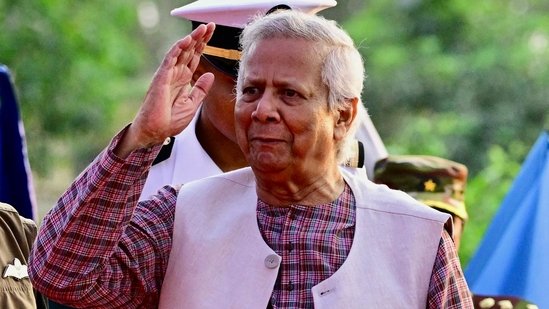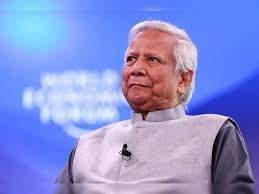
Nobel Peace Prize winner Muhammad Yunus, known around the world for his work in microfinance, has made a shocking announcement. He said that he may resign from all public and private roles if the political and legal pressure against him continues. This statement has come at a time when Bangladesh is facing large-scale protests, mainly from civil society groups, students, and international human rights activists.
The protests began after new legal actions were taken against Yunus. Many people believe that these legal moves are politically motivated. They think that the current government of Bangladesh is trying to silence one of the country’s most respected figures. As the protests grow, so does the concern about freedom of speech and fairness in the justice system.
Who is Muhammad Yunus?
Muhammad Yunus is a respected economist and social entrepreneur. He is best known for founding Grameen Bank, which gives small loans (microcredit) to poor people in Bangladesh, especially women. His idea helped millions of people come out of poverty and earned him the Nobel Peace Prize in 2006.
Yunus has also been involved in creating several social business companies that aim to solve problems such as health, education, and climate change. His influence goes beyond Bangladesh. He is invited to speak at global forums and works with international organizations on social issues.
However, in recent years, his relationship with the government has worsened. Officials accuse him of financial irregularities, violating labor laws, and misusing nonprofit funds. But Yunus has denied all these charges, saying that he is being unfairly targeted.
What Did Yunus Say?
In a recent statement, Yunus said he is under constant legal pressure, which makes it hard for him to work on his social projects. He said, “If this continues, I will be forced to leave all my roles in Bangladesh.” This includes his work with various foundations, non-profits, and educational institutions.
His message was emotional and clear. He said he is tired of fighting legal battles that take away his energy and time. “I have always worked for the poor, not for profit. But now I am being treated like a criminal,” Yunus added.
Why Are People Protesting?
The announcement by Yunus has sparked a wave of protests across the country. Thousands of people took to the streets in Dhaka, Chittagong, and other cities. Protesters are asking the government to stop harassing Yunus and to allow him to continue his work for the people of Bangladesh.
Many protestors held up signs with messages like “Respect Yunus” and “Stop Political Revenge.” Some wore T-shirts with the words “Stand With Yunus.” Students from universities, teachers, human rights groups, and even some former politicians have joined these demonstrations.
The protesters believe that the government is using the court system as a tool to punish someone who has international respect but is seen as a threat at home. Some fear that this kind of action could hurt Bangladesh’s image in the world and scare away investors and donors.
What Does the Government Say?
The Bangladesh government, led by Prime Minister Sheikh Hasina, denies that it is targeting Yunus unfairly. Officials say that all legal actions are based on evidence and due process. They argue that nobody is above the law, not even someone who has won the Nobel Prize.
Government supporters say that Yunus must answer the questions raised about his financial activities. They believe that public sympathy should not stop the legal system from doing its job.
However, many experts say that the government’s actions look more like a personal or political fight than a legal matter. They point out that this is not the first time the government has gone after critics or opposition voices.
International Reaction
Yunus is not just a hero in Bangladesh—he is known and respected around the world. After his resignation warning, several international leaders and human rights organizations expressed concern. They are urging Bangladesh to ensure a fair and transparent legal process.
A group of 40 Nobel laureates, including Malala Yousafzai and former US President Barack Obama, have written an open letter to the Bangladesh government. In the letter, they asked for the legal pressure on Yunus to stop. The letter says, “His work has brought pride to Bangladesh and should be protected, not punished.”
Groups like Amnesty International and Human Rights Watch have also joined in. They said that going after someone like Yunus sends a dangerous message to all human rights defenders in the country.
Impact on Bangladesh’s Reputation
This situation is not just about one person. It is also about Bangladesh’s reputation on the global stage. The country is trying to grow its economy and become a middle-income country. For that, it needs support from foreign investors, international banks, and development organizations.
When a world-famous figure like Muhammad Yunus is treated badly, it raises questions about justice, democracy, and human rights in Bangladesh. Experts say that the country may face loss of aid, reduced investments, and damage to its global image if things do not improve.
If Yunus resigns, it would be a big loss not just for Bangladesh but for the world. His ideas have helped millions, and his presence inspires many young social entrepreneurs.
The protesters have said they will continue their movement until the legal harassment stops. There are also calls for international organizations to send observers and raise the issue at global forums like the United Nations and the World Economic Forum.One thing is clear—this is not just about one man’s career. It is about the kind of country Bangladesh wants to be: a place where good work is supported, or where critics are silenced.































